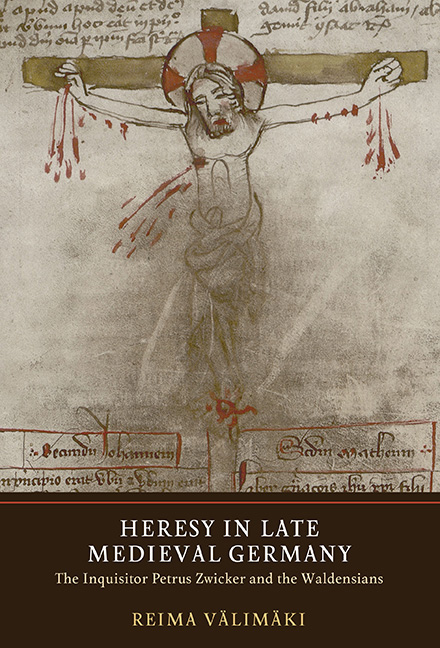Book contents
- Frontmatter
- Dedication
- Contents
- List of Illustrations
- Author's Note
- Acknowledgements
- List of Abbreviations
- Introduction
- 1 Petrus Zwicker and the Career of an Inquisitor at the Turn of the Fifteenth Century
- 2 The Inquisitor Writes
- 3 The Inquisitor's Practice and his Legacy
- 4 Communicating Faith
- 5 The Dissidents, the Clergy and the Church
- Epilogue: The Consolation of Inquisition
- Appendix 1 Manuscript Descriptions
- Appendix 2 Chapters and Titles of the Cum dormirent homines according to Jacob Gretser (1613/77)
- Appendix 3 The Circulation of the Processus Petri together with the Cum dormirent homines
- Appendix 4 Inquisitors' Manuals of St Florian and Linz
- Appendix 5 Collation of Formularies in St Florian, MS XI 234 and Würzburg, UB MS M. ch. f. 51
- Bibliography
- Index
- YORK MEDIEVAL PRESS: PUBLICATIONS
3 - The Inquisitor's Practice and his Legacy
Published online by Cambridge University Press: 26 March 2019
- Frontmatter
- Dedication
- Contents
- List of Illustrations
- Author's Note
- Acknowledgements
- List of Abbreviations
- Introduction
- 1 Petrus Zwicker and the Career of an Inquisitor at the Turn of the Fifteenth Century
- 2 The Inquisitor Writes
- 3 The Inquisitor's Practice and his Legacy
- 4 Communicating Faith
- 5 The Dissidents, the Clergy and the Church
- Epilogue: The Consolation of Inquisition
- Appendix 1 Manuscript Descriptions
- Appendix 2 Chapters and Titles of the Cum dormirent homines according to Jacob Gretser (1613/77)
- Appendix 3 The Circulation of the Processus Petri together with the Cum dormirent homines
- Appendix 4 Inquisitors' Manuals of St Florian and Linz
- Appendix 5 Collation of Formularies in St Florian, MS XI 234 and Würzburg, UB MS M. ch. f. 51
- Bibliography
- Index
- YORK MEDIEVAL PRESS: PUBLICATIONS
Summary
Item possunt facere conscribi libros in quibus continentur inquisiciones facte et processus habiti contra hereticos.
They can order books to be made, which contain the completed inquiries and processes against heretics.
Lombard inquisitor's manual, Linz, OOLB MS 177, fol. 79v.
Peter Zwicker was no ordinary inquisitor. He broke the mould. Or rather, he and his colleagues and assistants broke the mould. They utterly overhauled the models they had for inquisition and they produced new ones. They did this in the first instance by a complete updating of inquisitorial knowledge of Waldensian heresy, history and doctrine. They did it, secondly, through their introduction of a fundamental shift in the character of questions. There was a sea change. Even in the interrogation of ordinary believers or followers, there was now much more concentration on faith and doctrine. Furthermore, although these new questionnaires and formularies were used by later inquisitors, they circulated in a form that was accessible and useful to a wider circle of pastoral authorities. The framework Zwicker and his colleagues created for enquiry into Waldensian heresy was of course apt for judicial interrogation. But even more significant was its provision of aid to confessors, preachers and lecturers when they encountered heresy or criticism and doubt about Catholic doctrine and practices. This, as I shall argue, is the reason why the formularies composed by Zwicker's circle circulated in compilations notably different from the models Zwicker had at his disposal or the manual composed for his or his assistants’ use – which has luckily survived. The great majority of copies containing Zwicker's question formulas, copies of sentences or short descriptions of Waldensians are not professional and specialized manuals for inquisitors but more general compilations on heresy. Thus, as I see them, these manuscripts are the products and vehicles of the pastoralization of heresy, and they addressed audiences beyond their courtroom use by inquisitors and their notaries.
In giving the various compilations of Zwicker's inquisitorial material a common name, I follow Peter Biller and call them the Processus Petri. Even though in individual manuscripts the Processus Petri includes either the Cum dormirent homines or, more rarely, the Refutatio errorum, I treat these two polemical treatises as individual works and use the name Processus Petri for the collection of inquisitorial material.
- Type
- Chapter
- Information
- Heresy in Late Medieval GermanyThe Inquisitor Petrus Zwicker and the Waldensians, pp. 104 - 170Publisher: Boydell & BrewerPrint publication year: 2019

